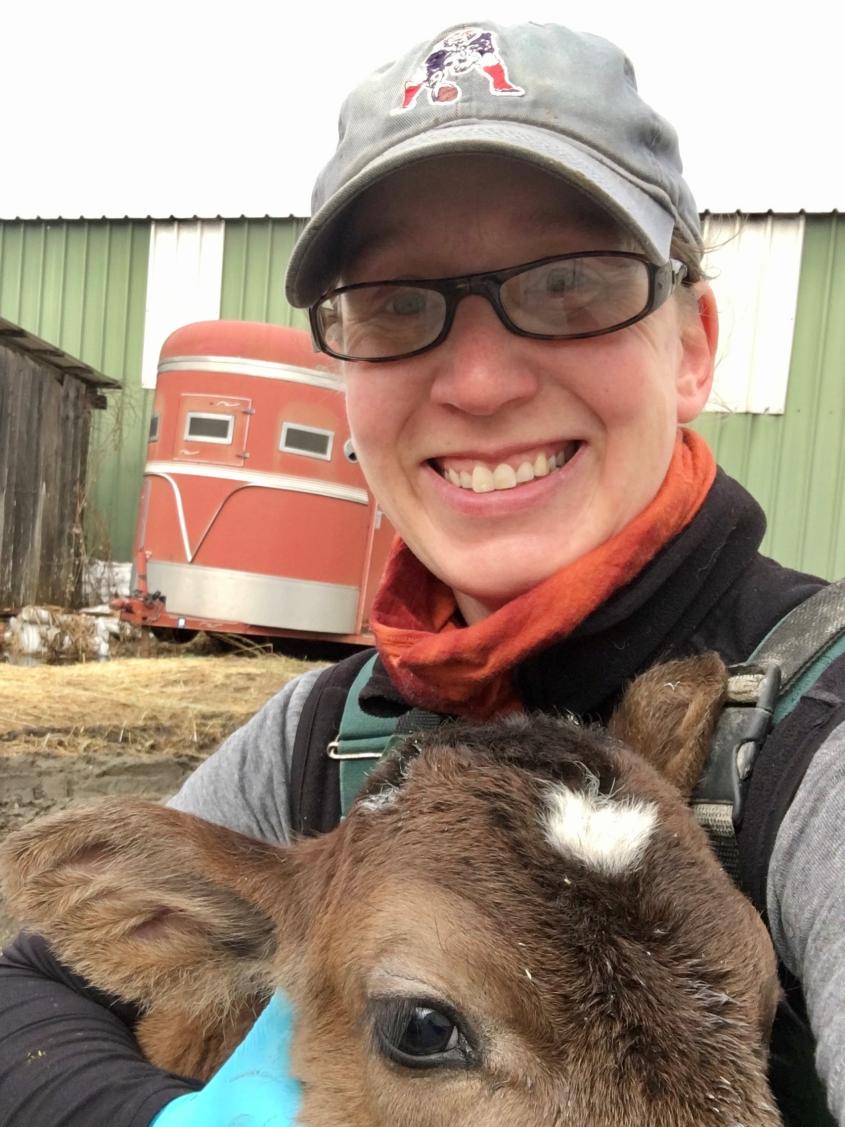Elizabeth Brock, M.S. ’06, D.V.M. ’15, brings love of dairy cows to National Board for Bovine Practitioners
Elizabeth Brock, M.S. ’06, D.V.M. ’15, didn’t touch a dairy cow until she was a freshman in college. But as a child growing up in rural New Hampshire, she was fascinated by cows.
“I think where most girls have their horse phase at 10 or 11, I was obsessed with cows instead,” she says.
When she took a course at the University of New Hampshire that gives students experience managing a registered herd of Holsteins, her mind was set. “It changed the course of my life,” she says. “I fell in love with cows for real with that experience.”
Today, Brock spends nearly every day monitoring the health of dairy cows as a veterinarian with Northwest Veterinary Associates, Inc. in St. Albans, Vermont. She now has a national influence on the veterinary cattle profession since she became the District 1 Director of the American Association of Bovine Practitioners (AABP).
Brock was elected to a full three-year term on the AABP board in May after an election to an unexpired term in 2017. She is one of three women on the 13-member board and represents a district that spans New England and New York.
“It was a little bit audacious for me to have run for this seat,” she says. “Typically, this board has been led by practitioners who are later on in their careers. But I felt like it was important to represent the changing demographics of our profession on the ground.”
As a board member, Brock has advocated for greater awareness of the growing number of women veterinarians specializing in bovine medicine and has supported strategies to reach younger cattle veterinarians more effectively through podcasts and online learning.
“The board and executive leadership have been very proactive in its shift in thinking about how do we reach a younger generation that might need to learn and access things differently than older folks,” she says.
After the coronavirus outbreak, the AABP played a critical role in providing training and resources for veterinarians about how to continue operating their practices safely during COVID-19. The association’s recommendations have included practicing social distancing on farms, limiting the number of farm personnel helping with work and delaying elective procedures.
On her rounds to dairy farms since the pandemic emerged, Brock stands a cow’s length away from her clients as she checks not only on the dairy cattle but also on the farmers who face mounting obstacles in producing milk during the coronavirus outbreak.
“This is an undertaking for all of us, but our farmers are being asked to do what they always do, which can take a toll on their physical and mental health,” Brock says. “They’re under a lot of pressure right now working in the face a pandemic and receiving way less money for it.”
Beyond keeping their facilities safe, dairy farmers are also facing declining prices in milk, despite strong demand from consumers, because of a shift from supplying schools and restaurants to retail stores. The loss of demand from schools and restaurants has led farmers across the country to dump milk because of the excess supply they cannot sell on the wholesale market.
“The challenges in the complex milk market have changed so much for my clients,” Brock says. “In a time when so much is already so hard, their businesses are going to take a huge hit, right when consumers need their product most.”
After earning a degree in animal science from University of New Hampshire, Brock wasn’t sure she wanted to become a veterinarian. Because of her interest in water quality and agriculture, she enrolled in a master’s program in soil science at Cornell and worked in farmland protection and land conservation after graduating.
The work made her realize that working on a farm with dairy cows was what she really wanted to do. “I was feeling very far removed from the farm,” she says. “I really wanted to be helping farmers on a more tangible level. It occurred to me that being a vet was really the right path for me.”
At the College of Veterinary Medicine, Brock took as many courses in dairy science as she could and became the student manager of the Cornell University Teaching Dairy, where she trained and scheduled the milking crew. A number of dairy professors, particularly Jessica McArt, D.V.M. ’07, Ph.D. '13, whose research focuses on dairy cattle diseases, also had a major influence on her.
“It was amazing to have Dr. McArt as a mentor,” Brock says. “She is a young woman in this field and a mom like I am, and it was great to have her as a role model to get a real-world vision for what my career would look like in this field.”
Brock said her dairy farmer clients have never had an issue working with a female veterinarian, even when she made her rounds while she was pregnant. “These guys understand reproduction and lactation more than most women I know,” says Brock, who has two sons. “If anything, it gives us a common ground.”
By Sherrie Negrea





